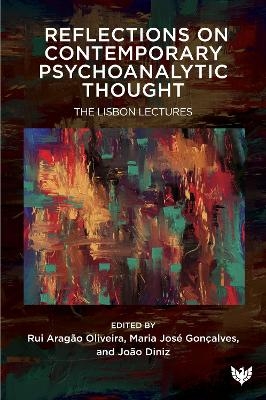
Reflections on Contemporary Psychoanalytic Thought
Phoenix Publishing House (Verlag)
978-1-80013-113-2 (ISBN)
Over the past decade, the Portuguese Psychoanalytical Society took the opportunity to restructure and redefine their organisation. As part of this process, they invited outstanding psychoanalysts from all over the world to present their thoughts, reflections, and clinical investigations. These conferences, workshops, and working groups helped shape the modern society, bringing in vibrant new ideas.
Reflections on Contemporary Psychoanalytic Thought showcases the best of these significant contributions with chapters from David Bell, Franco Borgogno, Luis J. Martín Cabré, R. D. Hinshelwood, Howard B. Levine, Andrea Marzi, Sérgio Eduardo Nick, Leopold Nosek, Fernando Orduz, Éric Smadja, and Virginia Ungar. Each chapter begins with an introduction from one of the editors, Rui Aragão Oliveira, Maria José Gonçalves, and João Diniz, which contextualises their impact at the time, the transformations they brought about, and their continuing relevance to the psychoanalytic community. A treasure trove of cutting-edge psychoanalytic ideas from leading critical thinkers, it brings insights into institutional dynamics, Freud and culture, virtual space and identity, the contemporary hysterical body, misogyny, the psychoanalytic community, suicide, the ideas of Sándor Ferenczi, and much more. Grouped into two stimulating sections – Psychoanalysis and contemporaneity and Theory of psychoanalytic technique – the book is an absolute must-read for psychoanalysts and will be of interest to other mental health professionals, students, and all open to engaging with contemporary psychoanalytic concepts.
Rui Aragão Oliveira is a full member and supervising analyst of the Portuguese Psychoanalytical Society (PPS) and International Psychoanalytical Association. He is the director of the training committee of the PPS, past president of the PPS, past editor-in-chief of the Portuguese Psychoanalytical Review, and past editor of Psychoanalysis Today. He teaches at the Psychoanalytical Institute in Lisbon and has been working with clinical groups for the IPA with the three level model. He has published on the theory of technique, paternal function, and clinical issues. Maria José Gonçalves is a medical doctor, child psychiatrist, psychoanalyst, child psychoanalyst, and full member and supervising analyst of the Portuguese Psychoanalytical Society (PPS) and International Psychoanalytical Association (IPA). She is the former president of the PPS Board and Institute Board, and past director of the PPS Training Committee. In the PPS Institute, she promotes the training on psychoanalytic ethics. She was a former director of the Department of Child and Adolescent Psychiatry of the Pediatric Hospital in Lisbon, where she founded a mental health infancy unit. She has published numerous papers, especially on infant psychoanalysis and on clinical issues. João Seabra Diniz is a full member and supervising analyst of the Portuguese Psychoanalytical Society (PPS) and International Psychoanalytical Association. He started his psychoanalytic training in Italy and continued it in Lisbon at SPP. For many years, he was involved in the formation of candidates for psychoanalysis. He is past president of the SPP and of the Institute of Psychoanalysis of Lisbon/SPP. He is the former director of the Social Action Service at Santa Casa da Misericórdia de Lisboa, and worked in the childhood and youth sector, where he collaborated in the launch of Adoption in Portugal. For some years, he collaborated with the Center for Judicial Studies, training in matters related to the abandonment and adoption of children. He is former national director of the Family and Child Support Project—PAFAC. He was a member of the National Commission for the International Year of the Child.
Acknowledgements
About the editors and contributors
Introduction
Part I
Psychoanalysis and contemporaneity
Introduction by Maria José Gonçalves
1. The institutional dynamics of psychoanalysis: the effect of the “development threatening idea”
R. D. Hinshelwood
Introduction by Maria José Gonçalves
2. Freud and culture
Éric Smadja
Introduction by João Seabra Diniz
3. The disappeared: a sorrow without dreams
Leopold Nosek
Introduction by Rui Aragão Oliveira
4. Virtual space, identity, and psychoanalysis: a new world or a dreadful voyage?
Andrea Marzi
Introduction by João Seabra Diniz
5. Contemporary hysterical body
Fernando Orduz
Introduction by Rui Aragão Oliveira
6. Connecting the International Psychoanalytical Association to our psychoanalytical community
Sérgio Eduardo Nick
Introduction by João Seabra Diniz
7. From the glass slipper to the glass ceiling
Virginia Ungar
Part II
Theory of psychoanalytic technique
Introduction by Rui Aragão Oliveira
8. Towards a two-track model for psychoanalysis
Howard B. Levine
Introduction by João Seabra Diniz
9. Who is killing what or whom: some notes on the internal phenomenology of suicide
David Bell
Introduction by Rui Aragão Oliveira
10. Achieving the elasticity of technique: Sándor Ferenczi’s psychoanalytic project and journey
Franco Borgogno
Introduction by Maria José Gonçalves
11. Ferenzci’s ideas in contemporary psychoanalysis: Ferenczi’s contribution to the psychoanalytic theory of trauma and further developments
Luis J. Martín Cabré
Final thoughts
Index
| Erscheinungsdatum | 25.10.2021 |
|---|---|
| Sprache | englisch |
| Maße | 152 x 229 mm |
| Gewicht | 340 g |
| Themenwelt | Geisteswissenschaften ► Psychologie ► Psychoanalyse / Tiefenpsychologie |
| ISBN-10 | 1-80013-113-5 / 1800131135 |
| ISBN-13 | 978-1-80013-113-2 / 9781800131132 |
| Zustand | Neuware |
| Haben Sie eine Frage zum Produkt? |
aus dem Bereich


